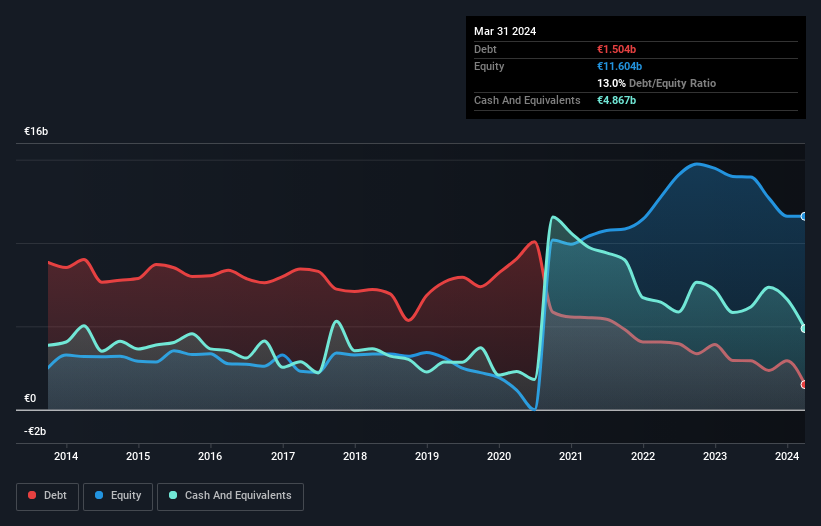
Warren Buffett famously said, 'Volatility is far from synonymous with risk.' So it seems the smart money knows that debt - which is usually involved in bankruptcies - is a very important factor, when you assess how risky a company is. Importantly, thyssenkrupp AG (ETR:TKA) does carry debt. But is this debt a concern to shareholders?
When Is Debt Dangerous?
Debt is a tool to help businesses grow, but if a business is incapable of paying off its lenders, then it exists at their mercy. In the worst case scenario, a company can go bankrupt if it cannot pay its creditors. However, a more frequent (but still costly) occurrence is where a company must issue shares at bargain-basement prices, permanently diluting shareholders, just to shore up its balance sheet. By replacing dilution, though, debt can be an extremely good tool for businesses that need capital to invest in growth at high rates of return. When we examine debt levels, we first consider both cash and debt levels, together.
View our latest analysis for thyssenkrupp
What Is thyssenkrupp's Net Debt?
The image below, which you can click on for greater detail, shows that thyssenkrupp had debt of €1.50b at the end of March 2024, a reduction from €2.95b over a year. But it also has €4.87b in cash to offset that, meaning it has €3.36b net cash.

A Look At thyssenkrupp's Liabilities
The latest balance sheet data shows that thyssenkrupp had liabilities of €12.0b due within a year, and liabilities of €7.23b falling due after that. Offsetting these obligations, it had cash of €4.87b as well as receivables valued at €6.43b due within 12 months. So its liabilities total €7.94b more than the combination of its cash and short-term receivables.
This deficit casts a shadow over the €2.06b company, like a colossus towering over mere mortals. So we definitely think shareholders need to watch this one closely. After all, thyssenkrupp would likely require a major re-capitalisation if it had to pay its creditors today. Given that thyssenkrupp has more cash than debt, we're pretty confident it can handle its debt, despite the fact that it has a lot of liabilities in total. The balance sheet is clearly the area to focus on when you are analysing debt. But it is future earnings, more than anything, that will determine thyssenkrupp's ability to maintain a healthy balance sheet going forward. So if you want to see what the professionals think, you might find this free report on analyst profit forecasts to be interesting.
In the last year thyssenkrupp had a loss before interest and tax, and actually shrunk its revenue by 12%, to €36b. That's not what we would hope to see.
So How Risky Is thyssenkrupp?
We have no doubt that loss making companies are, in general, riskier than profitable ones. And we do note that thyssenkrupp had an earnings before interest and tax (EBIT) loss, over the last year. And over the same period it saw negative free cash outflow of €10m and booked a €2.3b accounting loss. Given it only has net cash of €3.36b, the company may need to raise more capital if it doesn't reach break-even soon. Overall, we'd say the stock is a bit risky, and we're usually very cautious until we see positive free cash flow. When analysing debt levels, the balance sheet is the obvious place to start. But ultimately, every company can contain risks that exist outside of the balance sheet. To that end, you should be aware of the 1 warning sign we've spotted with thyssenkrupp .
Of course, if you're the type of investor who prefers buying stocks without the burden of debt, then don't hesitate to discover our exclusive list of net cash growth stocks, today.
If you're looking to trade thyssenkrupp, open an account with the lowest-cost platform trusted by professionals, Interactive Brokers.
With clients in over 200 countries and territories, and access to 160 markets, IBKR lets you trade stocks, options, futures, forex, bonds and funds from a single integrated account.
Enjoy no hidden fees, no account minimums, and FX conversion rates as low as 0.03%, far better than what most brokers offer.
Sponsored ContentNew: Manage All Your Stock Portfolios in One Place
We've created the ultimate portfolio companion for stock investors, and it's free.
• Connect an unlimited number of Portfolios and see your total in one currency
• Be alerted to new Warning Signs or Risks via email or mobile
• Track the Fair Value of your stocks
Have feedback on this article? Concerned about the content? Get in touch with us directly. Alternatively, email editorial-team (at) simplywallst.com.
This article by Simply Wall St is general in nature. We provide commentary based on historical data and analyst forecasts only using an unbiased methodology and our articles are not intended to be financial advice. It does not constitute a recommendation to buy or sell any stock, and does not take account of your objectives, or your financial situation. We aim to bring you long-term focused analysis driven by fundamental data. Note that our analysis may not factor in the latest price-sensitive company announcements or qualitative material. Simply Wall St has no position in any stocks mentioned.
Have feedback on this article? Concerned about the content? Get in touch with us directly. Alternatively, email editorial-team@simplywallst.com
About XTRA:TKA
thyssenkrupp
Operates as an industrial and technology company in Germany and internationally.
Flawless balance sheet and undervalued.


